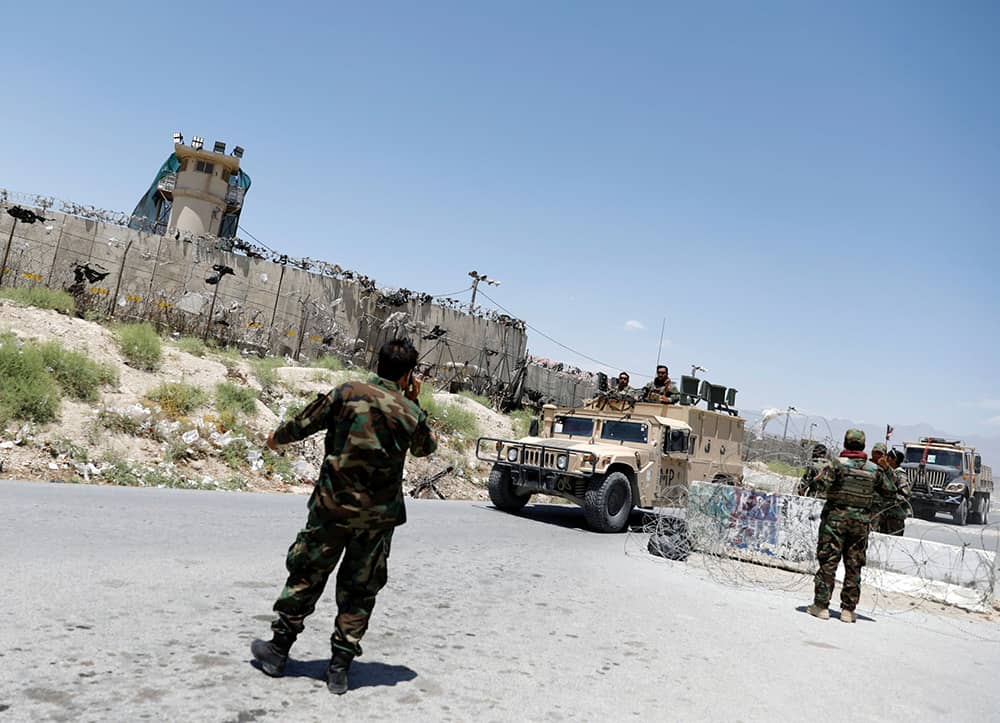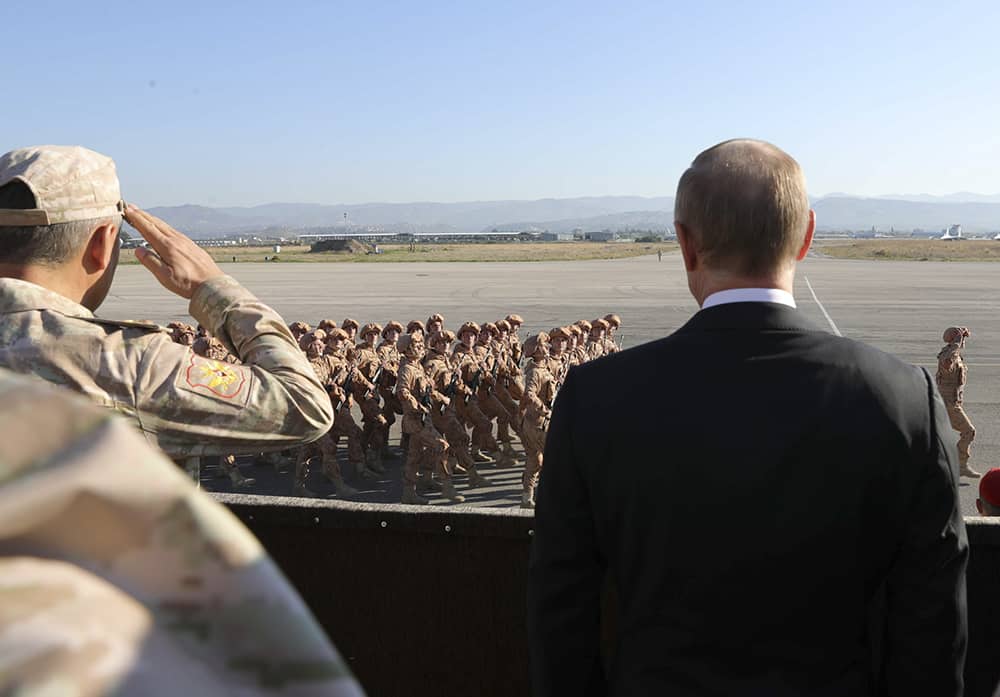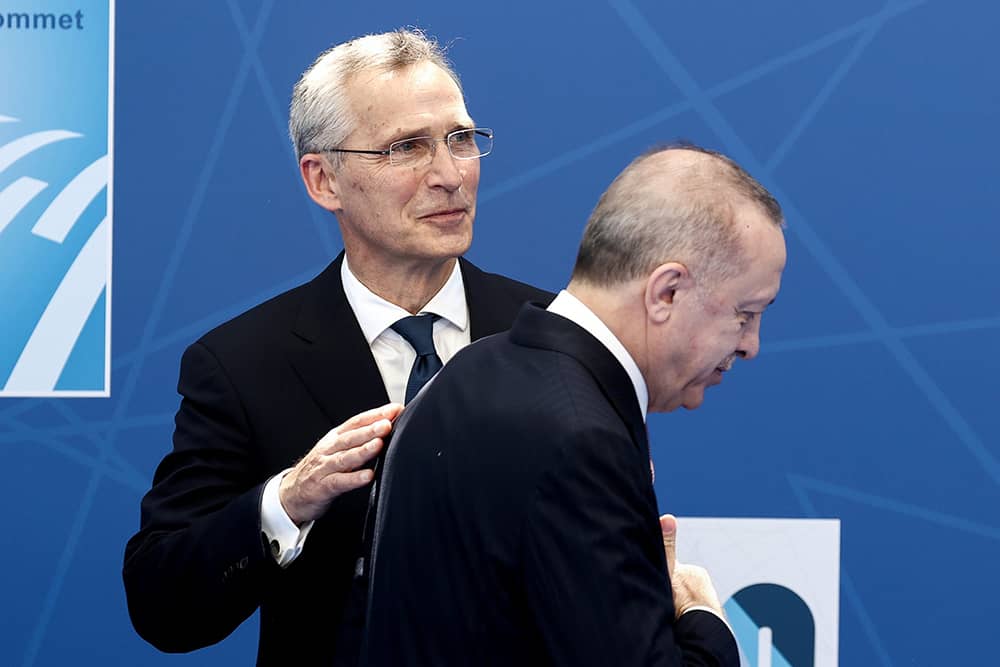Joe Biden and Donald Trump have little in common, with at least one major exception. Like his predecessor, the current president wishes to reduce American presence in the Middle East; yet unlike the 45th president, Biden seems determined to do so. Certainly, his announced withdrawal of American forces from Afghanistan, with an almost blind disregard of the second and third order consequences of such a move, indicates that he will press ahead with his Middle East plans as well.
>> Window on Washington: Read more from Dov S. Zakheim
Regional actors are already beginning to act upon the presumption of a reduced American presence. On March 27, after months of internal debate, Iran finally inked a long term security and economic agreement with China. The 25-year deal adds another link to China’s multibillion dollar Belt and Road Initiative, which ultimately is meant to connect China to Europe via the ancient Silk Road. While details of the agreement have not been made public, it reportedly calls for $400 billion of Chinese investments in Iranian infrastructure, banking, and information technology, over the next 25 years. Iran would, in turn, provide China with a regular supply of oil, presumably at a discounted price: It is already a targeted market for cheap Chinese products, to the dismay of local industries.

Afghan soldiers outside the Bagram air base, on the day the last of American troops vacated it in July. Photo credit: REUTERS/Mohammad Ismail
The agreement not only gives China unprecedented access to Iran and its economy, but it also enables China to create a significant military presence in the region. The agreement reportedly calls for an expansion of joint military exercises that the two countries have conducted for the past several years, as well as joint research, weapons development, and intelligence sharing. Most significantly, if the reported infrastructure arrangements prove to be accurate, China will obtain special access to Iranian ports on the Gulf. It would then only be a matter of time before Chinese warships took advantage of the facilities available to them. That, indeed, is the lesson of Beijing’s investment in Djibouti. Initially, China undertook to build a railway, water pipeline, and a new seaport in the small state on the Horn of Africa. In 2016, just three years after signing the port development agreement, China announced that it would now build a naval base adjacent to the new port. Beijing may follow a similar timetable as it deepens its economic penetration of Iran. All in all, China stands to become a major regional actor, even as Washington’s national security establishment has adjusted its focus to Europe and East Asia—and the result may weaken the American position in both.
Whereas the prospect of a major Chinese Middle Eastern presence is still some years into the future, Russia has been playing an outsized role in the region for some time. Along with the military presence of Iran and its proxies, Russia’s support has been critical to the survival of the Assad regime in Syria. Over the course of the civil war that continues to rage on after a decade with no clear end in sight, Russia has been able to close a number of agreements to enable it to maintain a long-term presence in the country. These include a 99-year lease on the naval bases at Tartus and a long-term lease on the Russian built airbase in Khmeimim, near the port of Latakia in northwestern Syria.
Russia is expanding one of the Khmeimim runways by 1,000 feet, which would enable it to support heavier aircraft, including bombers, and thereby extend Moscow’s operational reach throughout the entire region. It is therefore ironic that while the United States seeks to shift its security and especially military focus to what it terms a “great power competition” with China and Russia, those selfsame great powers are moving decisively to establish a long-term political and military presence in the Middle East.

America’s adversaries are not the only ones to respond to Washington’s changing regional priorities. Given Donald Trump’s expressed desire to have American troops leave the region, Washington’s friends and allies have begun to hedge their political and military bets. Indeed, the emphasis that Joe Biden’s administration is placing on human rights has further energized many regional states to develop strategies to offset what is certain to be an increasingly abrasive relationship with the US.
In particular, Turkey, the United Arab Emirates, Egypt, and Saudi Arabia all find themselves in the crosshairs of the Democratic Party’s left wing. So does Israel. The Democratic left despises the Turkish and Arab authoritarian leaders who have long been viewed as “moderates.” And the left has no more love for Israel. Indeed, Betty McCollum, the new chair of the powerful House of Representatives Foreign Operations subcommittee that allocates funds for foreign assistance, has introduced legislation that would withhold military assistance funding if it is determined that Palestinian rights have been violated. Called the “Defending the Human Rights of Palestinian Children and Families Living Under Israeli Military Occupation Act,” the legislation, in the words of a statement issued by McCollum’s office, “prohibits Israel from using US taxpayer dollars in the Occupied West Bank and East Jerusalem for: the military detention, abuse, or ill-treatment of Palestinian children in Israeli military detention; to support the seizure and destruction of Palestinian property and homes in violation of international humanitarian law; or, to extend any assistance or support for Israel’s unilateral annexation of Palestinian territory in violation of international humanitarian law.”
The legislation has received strong support from an array of organizations who also constitute the Democratic Party’s so-called “progressive” base. While the likelihood of passage is minimal, the legislation signals a willingness on the part of many Democrats to pressure Israel and, indeed, the Biden administration in the name of human rights.
The targets of the American left’s wrath are hedging their bets in different ways. Israel has maintained a robust technical and military dialogue with Russia, so as to ensure that there will be no interference with the ongoing “campaign between the wars” in Syria. It is notable that Jerusalem has not publicly voiced concerns about the Russian bases in Syria. Moreover, it has worked out a deconfliction strategy with Moscow that has enabled it to hit Iranian targets with negligible Russian protestations. Indeed, Israel may well prefer that Russia remain in Syria so as to offset Iran’s growing economic and military influence in that country.
Israel also has long maintained an important economic relationship with China, although all military exports (which would have greatly strengthened Israeli industries) are strictly off-limits in order not to antagonize the US—a situation which might change if the future of American aid is put in question. It is perhaps the reason that Jerusalem has been noticeably silent about the Chinese–Iranian deal, even as then prime minister Benjamin Netanyahu continued to vent over the prospect of a new, or more accurately, renewed Joint Comprehensive Plan of Action, better known as the Iran nuclear deal. Indeed, Jerusalem is concerned that the Biden administration seems overly eager to consummate the deal; it appears willing to remove economic sanctions on Iran, notably with respect to oil sales and finance, even before an agreement is reached. Moreover, while Washington promises to follow up a renewed nuclear deal with an agreement to limit Iran’s disruptive behavior in the region, the Tehran leadership has made it clear that it has no real interest in such an agreement. No wonder the Israelis worry whether Washington will remain as committed an ally as it has been for the past several decades.
Unlike Israel, whose relations with the Trump administration were quite warm and now is receiving a lukewarm shoulder from Washington, Turkey’s interactions with America have been more problematic and, as with Israel, could well worsen. It is true that Ankara has made some gestures toward both Israel and Egypt, with whom it has been at odds for years. Similarly, Turkey seems to be moving away from the “Eurasia” policy that underscored Turkey’s independence from the West, even as it remained a member of NATO.

Nevertheless, the underlying causes of Washington’s strained relations with Ankara have persisted even as Presidents Trump and Erdoğan maintained cordial, even warm personal relations. The friction between Washington and Ankara over Turkey’s acquisition of Russian S-400 air defense systems has not abated. Turkey was expelled from the F-35 program, and in December 2020, the Trump administration imposed a ban on all US export licenses and authorizations to the country’s military procurement agency, the Ministry of Defense Industries, as well as an asset freeze and visa restrictions on its chief executive officer. These sanctions still remain in force.
Yet another cause for American concern is Erdoğan’s musing about either withdrawing from the 1936 Montreux Convention, which regulates cargo ships in the Bosporus and the Dardanelles and limits the access of military vessels; or alternatively, making the planned Istanbul Canal exempt from the treaty. The Russian navy would benefit the most if Turkey abandoned the treaty. It is noteworthy that when a group of retired admirals signed a letter protesting Erdoğan’s reported plan, the government promptly arrested ten of them.
More than any other factor, however, it is Turkey’s abysmal human rights record that has aggravated the relations between Washington and Ankara. Human rights activists continue to lobby for additional sanctions on Turkey due to the Turkish government’s ongoing mistreatment of its Kurdish population and its arrest of hundreds of journalists and civil servants, as well as of military officers who now languish in Turkish jails. The ascendance of human rights activists in the Biden administration, as well as Biden’s April 24 recognition of the Armenian Genocide – which upended years of previous administrations’ reluctance to do so—render the prospect for an American–Turkish rapprochement exceedingly dim. At the same time, Ankara’s strong ties to Moscow have remained resilient despite Turkey’s support both for Azerbaijan in the latest flare-up with Russian-supported Armenia and for Kiev in the face of Moscow’s massive buildup on Ukraine’s eastern border.
Human rights issues are also complicating America’s relations with long-time allies Saudi Arabia, the UAE, and Egypt. American legislators have bitterly criticized Saudi and Emirati operations in their war against the Yemeni Houthis. They hold both countries accountable for Yemen’s ongoing humanitarian disaster. In 2019 it took a veto from President Trump to block Senate resolutions that would have prevented the sale of precision-guided munitions to both Saudi Arabia and the UAE.
While some legislators have sought to block the sale of F-35 fighters to the UAE, as a result of its record in Yemen, the preponderance of congressional anger has been leveled at Riyadh because of the brutal murder of the journalist Jamal Khashoggi, which is almost universally believed to have been instigated by Crown Prince Mohammed bin Salman.
On April 21 the House of Representatives, normally bitterly divided between the razor-thin majority Democrats and the Republican minority but still agitated over the Khashoggi murder, overwhelmingly passed “The Protection of Saudi Dissidents Act of 2021” with a bipartisan majority of 350–71. The legislation would put a four-month freeze on arms and defense-related sales to the Kingdom. The freeze would remain in force unless the president were to certify that that Saudi Arabia “has not conducted forced repatriation, silencing, or killing of dissidents in other countries; unjust imprisonment in Saudi Arabia of US citizens or lawful aliens; or torture of detainees in custody of the government of Saudi Arabia.” In addition, the president must certify that no Saudi diplomatic officials are using their credentials to track or harass Saudi nationals in the US. Absent that determination, the president “shall close at least one Saudi diplomatic or consular facility in the United States until the certification is made.”
Other pieces of anti-Saudi legislation are wending their way through the House. One, sponsored by Rep. Tom Malinowski, who served as assistant secretary for democracy and human rights in the Obama administration, would bar Saudi Crown Prince Mohammed and some other senior Saudi officials from entering the US. It is not clear whether the House will act upon Malinowski’s proposal, or any other pieces of legislation apart from the one it has already approved, but it is evident that human rights advocates both within and outside the Biden team have numerous allies on Capitol Hill.
For its part, Riyadh has begun to receive some military systems from Russia, and the two countries are reportedly establishing a joint manufacturing facility for Kalashnikov assault rifles. Most significantly, the Kingdom is supposedly negotiating the purchase of S-400 air defense systems and Su-35 jets with Russia, three years after the two countries signed a military cooperation agreement. Should that purchase be finalized, Riyadh would also be subject to US sanctions, further widening the divide with this traditional American ally. Indeed, yet another example of the Kingdom’s effort to hedge against further troubles in Washington is the report that the Iraqi government has facilitated Saudi diplomatic contact with Iran, even though Riyadh still portrays Tehran as a security threat.
Egypt’s President Abdel Fattah el-Sisi is also in the bad books of human rights activists. They are finding it more difficult to impose economic or other penalties on Egypt because of long-standing commitments that were key to the 1979 Israeli–Egyptian treaty, and which still underpin Israeli–Egyptian peace. Nevertheless, human rights concerns led even the Trump administration to cut aid to Egypt in 2017 by $100 million and to put an additional $195 million on hold until Egypt improved its human rights record; those funds were restored a year later. Nevertheless, human rights advocates have continued to criticize Egypt, and the Biden administration has thus far shown little warmth toward Cairo. It is noteworthy that well into April President Biden had yet to phone his Egyptian counterpart.

Photo credit: REUTERS/Mohamed Abd El Ghany
Uncertainty about Washington’s intentions toward the region in general and Egypt in particular has led Cairo also to consider hedging its American bets. Already in 2019, Egypt purchased 40 Russian Ka-52 attack helicopters and signed an agreement to acquire 24 Russian Su-35 aircraft, despite US objections. The first five of those planes were delivered in July 2020. In February 2021, Secretary of State Antony Blinken warned his Egyptian counterpart that proceeding with the purchase would trigger sanctions under the “Countering America’s Adversaries Through Sanctions Act,” the same law that triggered sanctions against Turkey for purchasing the S-400 system. Nevertheless, Egyptian leaders have refused to back down in the face of American pressure.
Clearly, the combination of America’s strategic shift away from the Middle East and its renewed concern for human rights is affecting the calculus of many of its long-standing allies. Both China and Russia appear ready and willing to fill the vacuum, which America is apparently leaving behind despite its denials to the contrary. Whether Washington can truly avoid becoming once again enmeshed in Middle Eastern instability is an entirely different matter. To paraphrase what Dennis Ross told James Baker, then secretary of state, the US might wish to leave the Middle East, but the Middle East may not leave the US. Were that to happen, Washington might come to regret that it chose to hold at arm’s length those allies that it now would sorely need on its side.

